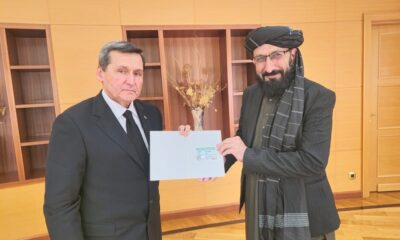World
Ukraine insists on territorial integrity as talks loom
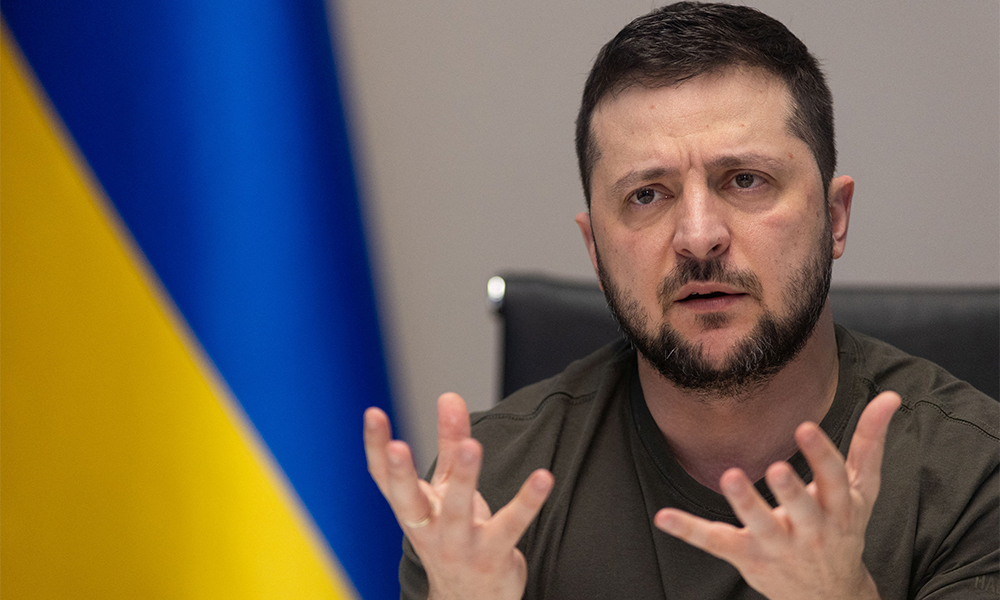
With peace talks between Russia and Ukraine set to take place in Turkey this week, Ukrainian President Volodymyr Zelenskiy insisted on the territorial integrity of his country after earlier suggesting he was ready for a compromise.
Zelenskiy said in his video address to the Ukrainian people late on Sunday that in talks due to take place in Istanbul his government would prioritise the “territorial integrity” of Ukraine.
But in comments made to Russian journalists earlier in the day Zelenskiy adopted a different tone, saying Ukraine was willing to assume neutral status and compromise over the status of the eastern Donbas region as part of a peace deal.
In the video call that the Kremlin pre-emptively warned Russian media not to report, Zelenskiy said any agreement must be guaranteed by third parties and put to a referendum.
“Security guarantees and neutrality, non-nuclear status of our state. We are ready to go for it,” he added, speaking in Russian.
Even with talks looming, Ukraine’s head of military intelligence, Kyrylo Budanov, said Russian President Vladimir Putin was aiming to seize the eastern part of Ukraine.
“In fact, it is an attempt to create North and South Korea in Ukraine,” he said, referring to the division of Korea after World War Two. Zelenskiy has urged the West to give Ukraine tanks, planes and missiles to help fend off Russian forces.
In a call with Putin on Sunday, Turkish President Tayyip Erdogan agreed to host the talks and called for a ceasefire and better humanitarian conditions, his office said. Ukrainian and Russian negotiators confirmed that in-person talks would take place.
Top American officials sought on Sunday to clarify that the United States does not have a policy of regime change in Russia, after President Joe Biden said at the end of a speech in Poland on Saturday that Putin “cannot remain in power”.
U.S. Secretary of State Antony Blinken said Biden had simply meant Putin could not be “empowered to wage war” against Ukraine or anywhere else.
After more than four weeks of conflict, Russia has failed to seize any major Ukrainian city and signalled on Friday it was scaling back its ambitions to focus on securing the Donbas region, where Russian-backed separatists have been fighting the Ukrainian army for the past eight years.
A local leader in the self-proclaimed Luhansk People’s Republic said on Sunday the region could soon hold a referendum on joining Russia, just as happened in Crimea after Russia seized the Ukrainian peninsula in 2014.
Crimeans voted overwhelmingly to break with Ukraine and join Russia – a vote that much of the world refused to recognise.
Budanov predicted Ukraine’s army would repel Russian forces by launching a guerrilla warfare offensive.
“Then there will be one relevant scenario left for the Russians, how to survive,” he said.
Ukraine’s foreign ministry spokesperson also dismissed talk of any referendum in eastern Ukraine.
“All fake referendums in the temporarily occupied territories are null and void and will have no legal validity,” Oleg Nikolenko told Reuters.
‘CRUEL AND SENSELESS’
Moscow says the goals for what Putin calls a “special military operation” include demilitarising and “denazifying” its neighbour. Ukraine and its Western allies call this a pretext for unprovoked invasion.
Ukraine has described previous negotiations, some of which have taken place in Russian ally Belarus, as “very difficult”.
The invasion has devastated several Ukrainian cities, caused a major humanitarian crisis and displaced an estimated 10 million people, nearly a quarter of Ukraine’s population.
Tatyana Manyek, who crossed the Danube by ferry into Romania on Sunday with other refugees, said people in her home city of Odesa were “very afraid” but she would have stayed were it not for her daughter.
“It would be very difficult to provide the child with basic living conditions. That’s why we decided to leave,” she said, clutching a pet dog.
In his Sunday blessing, Pope Francis called for an end to the “cruel and senseless” conflict.
HUMANITARIAN CORRIDORS
Russia has continued to move additional military units to the Ukraine border and is launching missile and air strikes on Ukrainian forces and military infrastructure, including in the city of Kharkiv, the Ukrainian military said on Sunday night.
Ukraine also raised concerns about the safety of the Russian-occupied defunct nuclear power plant at Chernobyl, the site of the world’s worst civil nuclear accident in 1986.
Russian forces have created a risk of damaging the containment vessel constructed around the station’s wrecked fourth reactor, said Ukrainian Deputy Prime Minister Iryna Vereshchuk. She urged the United Nations to dispatch a mission to assess the risks.
Ukrainian Interior Ministry adviser Vadym Denysenko said Russia had started destroying Ukrainian fuel and food storage centres. Appearing to confirm that, Russia said its missiles had wrecked a fuel deposit on Saturday as well as a military repair plant near the western city of Lviv.
The mayor of Slavutych, the town created and built to house the plant’s staff in the aftermath of the 1986 accident, said early on Monday that Russian forces that took over the town at the weekend had now left.
Yuri Fomichev said in an online video post that the troops “completed the work they had set out to do” and were gone. He originally said three people had been killed in clashes.
The United Nations has confirmed 1,119 civilian deaths and 1,790 injuries across Ukraine but says the real toll is likely to be higher. Ukraine said on Sunday 139 children had been killed and more than 205 wounded so far in the conflict.
Vereshchuk said 1,100 people were evacuated from frontline areas, including the southern city of Mariupol, after Ukraine and Russia agreed to set up two “humanitarian corridors.”
The encircled port, located between Crimea and eastern areas held by Russian-backed separatists, has been devastated by weeks of heavy bombardment. Thousands of residents are sheltering in basements with scarce water, food, medicine or power.
World
Barack and Michelle Obama endorse Harris in video of live call
Obama, the first U.S Black president, remains one of the most popular figures in the Democratic party even after more than a decade has passed since he was last elected.

Former President Barack Obama and his wife Michelle endorsed Kamala Harris’ bid for president on Friday in a roughly one-minute long video that captured a private phone call between the couple and the current vice president.
“We called to say Michelle and I couldn’t be prouder to endorse you and to do everything we can to get you through this election and into the Oval Office,” Obama told Harris.
“I am proud of you. This is going to be historic,” the former first lady told Harris.
Talking into a cell phone and cracking a few smiles, Harris expressed her gratitude for the endorsement and their long friendship.
“Thank you both. It means so much. And we’re gonna have some fun with this too,” Harris said.
The campaign said the video was the actual call, not a reenactment.
Harris’s surprise bid against Republican rival Donald Trump continues to gain steam from supporters, donors and politicians less than a week after President Joe Biden bowed out of the race amid slumping poll numbers.
Obama, the first U.S Black president, remains one of the most popular figures in the Democratic party even after more than a decade has passed since he was last elected.
Obama has lent his support to Biden during big-money fundraisers, which were among some of the biggest blockbuster events of his campaign.
The endorsement could help activate and sustain energy and fundraising for Harris’ campaign and it signals he is likely to get on the campaign trail for Harris once she is officially the presumptive nominee.
Obama initially withheld his endorsement even as Biden, his former vice president, anointed her as his heir apparent. Obama reportedly did not want to put his thumb on the scale as the party worked through the process of determining its nominee. – Reuters
World
Gaza ceasefire negotiations appear to be in closing stages, senior US official says
The senior U.S. official said both Biden and Harris are “completely aligned” on U.S. policy toward Israel and Gaza.
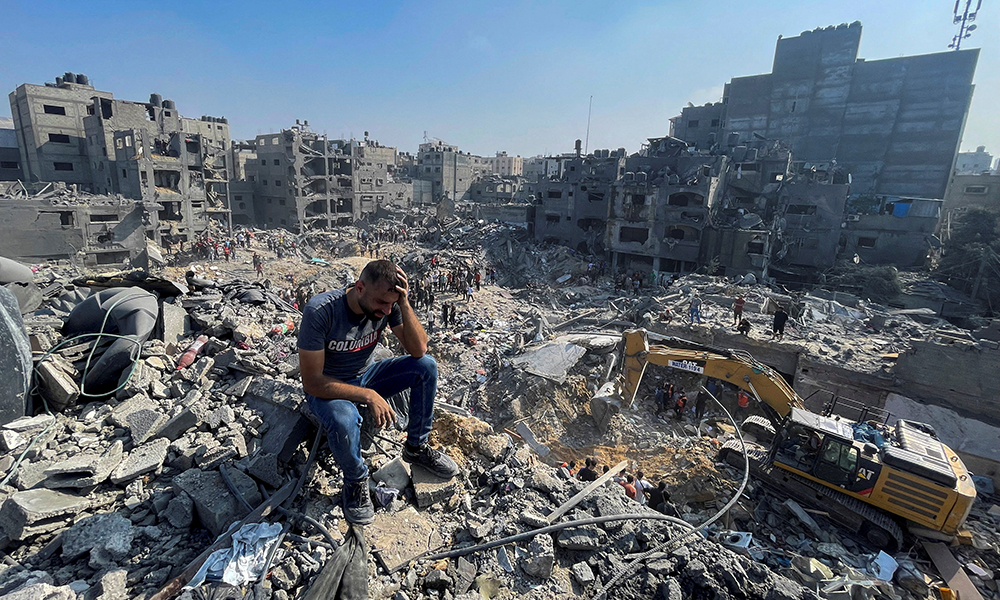
Negotiations on a ceasefire-for-hostages deal in the Gaza conflict appear to be in their closing stages and U.S. President Joe Biden and Israeli Prime Minister Benjamin Netanyahu will discuss remaining gaps on Thursday, a senior U.S. official said on Wednesday.
The official, briefing reporters ahead of their talks, said the remaining obstacles are bridgeable and there will be more meetings aimed at reaching a deal between Israel and Hamas over the next week, Reuters reported.
Hamas-led fighters stormed into southern Israel on Oct.7, killing 1,200 people and taking 250 captives, according to Israeli tallies, triggering a war in which more than 38,000 people in Gaza have been killed.
Hamas and other militants are still holding 120 hostages; Israel believes around a third of them are dead.
Months of stop-and-start talks have failed to produce a deal to gain release of some of the remaining hostages.
The senior U.S. official said both Israel and Hamas still have some issues to resolve but that a deal is close in which a six-week ceasefire would take place in exchange for the release of women, elderly men and wounded hostages over a 42-day period, read the report.
“It’s a very different negotiation now than just a month ago when we had some fundamentally unbridgeable issues,” the official said.
Biden will hold talks with Netanyahu and then later in the day Vice President Kamala Harris will have a separate meeting with the Israeli leader.
Harris has taken over as the presumed Democratic choice for the November presidential election against Republican Donald Trump, after Biden opted not to seek reelection again under pressure from Democrats concerned about his mental acuity.
The senior U.S. official said both Biden and Harris are “completely aligned” on U.S. policy toward Israel and Gaza, Reuters reported.
“The Israelis will hear full alignment,” the official said.
Related Stories:
UN Security Council backs Israel-Hamas ceasefire plan
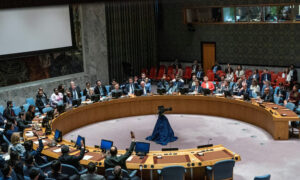
Biden says Israel-Gaza war should end now and Israel must not occupy Gaza
World
Harris bashes Trump over ‘fear and hate’ in debut rally
Harris ticked through a list of liberal priorities, saying that if elected she would act to expand abortion access, make it easier for workers to join unions and address gun violence, drawing a sharp contrast with Trump, the Republican nominee for president in the Nov. 5 election.

US Vice President Kamala Harris assailed Donald Trump on Tuesday at her first campaign rally since replacing President Joe Biden as the Democratic presidential candidate, while a Reuters/Ipsos opinion poll showed her taking a marginal lead over her Republican rival.
In a 17-minute speech, Harris aggressively went after Trump’s vulnerabilities, comparing her background as a former prosecutor to his record as a convicted felon, Reuters reported.
Harris ticked through a list of liberal priorities, saying that if elected she would act to expand abortion access, make it easier for workers to join unions and address gun violence, drawing a sharp contrast with Trump, the Republican nominee for president in the Nov. 5 election.
“Donald Trump wants to take our country backward,” she told a cheering crowd of several thousand at West Allis Central High School in a Milwaukee suburb in Wisconsin, a battleground state with a pivotal role in deciding the election outcome.
“Do we want to live in a country of freedom, compassion and rule of law, or a country of chaos, fear and hate?”
The raucous rally was a notable contrast to the smaller, more subdued events Biden held, underscoring Democrats’ hope that Harris, 59, can revive what had been a flagging campaign under Biden, 81.
The audience danced and waved Harris signs, while chants of “Ka-ma-la!” broke out when she took the stage.
Harris led Trump 44% to 42% among registered voters in the national Reuters/Ipsos poll, conducted on Monday and Tuesday after Biden dropped out of the contest on Sunday and endorsed Harris as his successor.
A Reuters/Ipsos poll last week showed Biden, before he ended his campaign, trailing Trump by two percentage points.
Both were within the poll’s three-point margin of error. But the results could signal limited movement in Democrats’ direction – and may suggest that Harris’ elevation to the top of the ticket blunted whatever momentum Trump hoped to gain from last week’s Republican National Convention, also in Milwaukee.
Trump and his allies have tried to tether Harris to some of Biden’s more unpopular policies, including his administration’s handling of the surge of migrants at the southern border with Mexico.
In a conference call with reporters on Tuesday, Trump expressed confidence in his ability to defeat Harris, noting that her previous presidential run in 2020 did not even survive until the first statewide nominating contest.
-

 Sport4 days ago
Sport4 days agoOlympics finally here; What you need to know
-

 Latest News5 days ago
Latest News5 days agoOCHA reports 110 die in landmine explosions in Afghanistan every month
-

 Regional5 days ago
Regional5 days agoChina braces for twin tropical cyclones after deadly flash floods
-

 Health4 days ago
Health4 days agoHealth partners provide services 589,205 people in Afghanistan in last month
-

 Latest News4 days ago
Latest News4 days agoAfghanistan’s Hajj ministry confirms death of 27 pilgrims in Mecca and Medina
-

 Business5 days ago
Business5 days agoConference on Islamic microfinance kicks off in Kabul
-

 Sport4 days ago
Sport4 days agoACB proposes ODI fixtures against top-tiered teams
-
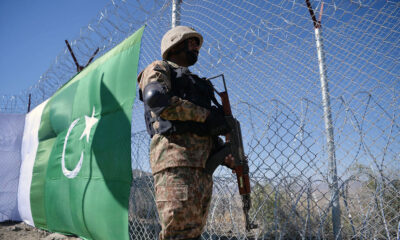
 Latest News4 days ago
Latest News4 days agoIslamabad claims three terrorists killed at Pakistan-Afghanistan border


